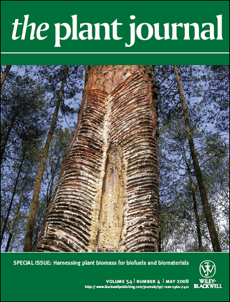The Plant Journal is pleased to present a series of invited peer-reviewed articles that describe processes that plants can or could use to convert their fixed carbon into fuels and other useful products. The articles were commissioned to provide an authoritative scientific backdrop to inform discussion in debates on finding alternative and reliable sources of carbon. Co-edited by Christoph Benning from Michigan State University and Eran Pichersky from the University of Michigan, this special issue is freely available.
The 17 articles in this special issue cover topics related to the production of biofuel from plant or algal biomass. In addition, several articles highlight the usefulness of plant s for the production of pharmaceutical drugs and other high value chemicals and polymers. A flavour of the scope of articles is given below.
Smith reports on how increases in yield of starch and sugars could lead to a sustainable production of bioethanol as a liquid transport fuel. The major scientific and technical research challenges of utilizing the abundance of plant cell walls as a renewable resource is discussed in two articles by Pauly and Keegstra and Li et al. The challenges facing the widespread adoption of biodiesel are addressed by Durret et al.
Biofuel production from microalgae, pond scum, is discussed by Hu et al. as an alternative to land-based agricultural production of plant biomass that may avoid competition with food production. Trichomes, leave hairs, are highly specialized chemical factories that produce valuable compounds such as peppermint oil as explained by Schillmiller et al.
The special issue clearly illustrates the scope of involvement of plant biologists and biochemists in contributing rational solutions to the global shortage of fossil carbon supply. It intends to provide a sound and balanced plant biology and biochemistry background on the topic to educators and media as well as experts and interested laypeople.

The Issue contains:
- Editorial: Harnessing plant biomass for biofuels and biomaterials by Christoph Benning and Eran Pichersky
- Platform biochemicals for a biorenewable chemical industry
- Prospects for increasing starch and sucrose yields for bioethanol production
- Cell-wall carbohydrates and their modification as a resource for biofuels
- Improvement of biomass through lignin modification
- Microbial conversion of sugars from plant biomass to lactic acid or ethanol
- Plant triacylglycerols as feedstocks for the production of biofuels
- Deciphering gene regulatory networks that control seed development and maturation in Arabidopsis
- Microalgal triacylglycerols as feedstocks for biofuel production: perspectives and advances
- High-value oils from plants
- Terpenoid biomaterials
- Plant surface lipid biosynthetic pathways and their utility for metabolic engineering of waxes and hydrocarbon biofuels
- Production of renewable polymers from crop plants
- Harnessing plant trichome biochemistry for the production of useful compounds
- Biosynthesis of plant-derived flavor compounds
- Biosynthesis of plant pigments: anthocyanins, betalains and carotenoids
- Nature’s assembly line: biosynthesis of simple phenylpropanoids and polyketides
- Opium poppy and Madagascar periwinkle: model non-model systems to investigate alkaloid biosynthesis in plants
The Articles of the Special Issue can be downloaded here. It is also accompanied by a podcast download – an interview with Christoph Benning, Co-Editor and Professor of Biochemistry and Molecular Biology – online here.
(Cf. news from 2008-05-05.)
Source
Wiley-Blackwell, 2008-05.
Share
Renewable Carbon News – Daily Newsletter
Subscribe to our daily email newsletter – the world's leading newsletter on renewable materials and chemicals










